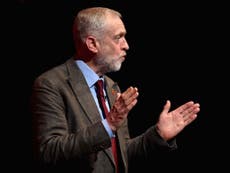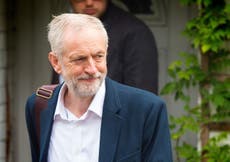Corbyn can get rid of his critics in the Shadow Cabinet now - but it won't help that much
Is this all an invention of an establishment media trying to destabilise a left-wing leader? Or have Corbyn's staff been briefing journalists in order to frighten non-Corbynite MPs into line?


The new “kinder politics” advocated by Jeremy Corbyn asks Labour Party members to treat others as they would expect to be treated. Naturally, this means war. Right-wingers expect to be purged and Corbynites know that their enemies would try to expel them if they had a chance.
Hilary Benn, defined for these purposes as a right-winger, was reported yesterday to be “relaxed” about the possibility that he might be shuffled out of the post of shadow Foreign Secretary. As well he might be; he is not paranoid, because they are out to get him. We know that not because sources close to the Labour leader have been briefing the newspapers, but because we saw Corbyn’s face during Benn’s wind-up speech in the Syria debate on 2 December.
“What we know about fascists is that they have to be defeated.” Corbyn took that bit particularly badly: he does not like his anti-fascist credentials being found wanting, and certainly not by the son of his late friend and mentor.
One could not help but admire the anonymous “friend” of Benn Junior who told The Independent yesterday: “We do expect a reshuffle soon, but half of Hilary’s constituency is under water.” Translation: “While Corbyn is playing petty politics with the internal divisions of the Labour left, Benn is attending to the urgent needs of his constituents.” And so if Corbyn does move Benn next week, his standing will be that bit further diminished.
But why is the press full of speculation that Corbyn intends to reshuffle the Shadow Cabinet? Is it the invention of an establishment media trying to destabilise a left-wing leader? Or have the left-wing leader’s staff been briefing journalists in order to frighten non-Corbynite MPs into line?
Here it is worth distinguishing between “briefing” and “seepage”. It was a distinction that Peter Mandelson sought to impress on Gordon Brown, as the last Labour Prime Minister raged about some conspiracy of the universe and Rupert Murdoch to do him down. Some Corbynites might see Lord Mandelson as the Prince of Sellout City whose sophistry in such matters is not to be trusted, but Seumas Milne, the Guardian journalist who is now Corbyn’s head of communications, got on well with him and will recognise the value of his insight.
It is seepage, then, rather than a deliberate tactic of intimidation. Journalists do not need Milne to drip hints in their ears when, like Benn’s friends, they can watch Corbyn’s face as he sat behind one of the more extraordinary parliamentary orations of recent times. Never mind the new politics, the open debate and the straight-talking, that was no fun at all. You do not need a steer from the inside to know that Corbyn would rather have as shadow Foreign Secretary someone who agreed with him. Nor does the press have to be biased against Corbyn to point this out.
Equally, Corbyn has a problem with Maria Eagle, the shadow Defence Secretary, who supports the renewal of Trident, and with Angela Eagle, the shadow First Secretary of State, who is resolute in standing by her sister. Corbyn now also realises how much power he has ceded to Rosie Winterton, the Labour chief whip, and how he would, ideally, like someone who agrees with him in that position too.
All of that can be deduced by observation. It is the possible timing of the reshuffle – as early as Monday – that has seeped out. Corbyn’s operation is not yet capable of the sort of message discipline that you would expect from the press office of a small toy company, but it is possible that those of Corbyn’s advisers urging him to strike early have shared that observation with journalists, partly with a view to encouraging their leader to get on with it.
As to what Corbyn will actually do, however, we are better advised to step back and study the forces operating on him than to listen to the gossip. The big fact about Corbyn’s situation is that he has the positive support of only 20 Labour MPs out of 232, yet also enjoys that of an overwhelming majority of a party membership/ supportership last reported to number 632,000.
When appointing his first Shadow Cabinet (and none of that left-wing nonsense about allowing Labour MPs to elect it), he felt forced to include people whose views were opposed to his own in senior positions. He also made two concessions on policy – one permanent, and one temporary. The permanent concession was on Europe: party members and MPs alike are pro-EU, so he has quietly forgotten his Euroscepticism. The temporary amendment was over Trident. He accepted existing Labour policy, which is to renew the UK’s nuclear weapons. He tried to change it at the party conference, two weeks after he was elected leader, but the trade unions stopped him.
Next year he will try again, and he will probably succeed. Party members, especially those who have joined recently, are against Trident. When Labour policy changes, the party’s spokespeople would have to change, so why not move Benn and Eagle now? The main constraint is the shortage of supporters in parliament with whom to replace them. He knows, for example, that Diane Abbott would serve his cause badly as shadow Foreign Secretary. We can therefore expect promotions from the ranks of the relatively unknown: from the mid-ranking careerists, and the new intake.
Corbyn has two options in dealing with his unusual situation: big tent or little tent. He could build alliances across the parliamentary party, operating by consensus and offering free votes when needed; or, he could purge those who disagree with him and use the power of the members to push the malleable centre of Labour MPs in his direction.
Little tent and civil war it is, then.



Join our commenting forum
Join thought-provoking conversations, follow other Independent readers and see their replies